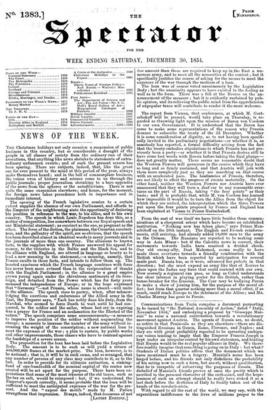NEWS OF THE WEEK.
Min Christmas holidays not only occasion a suspension of public business in this country, but so considerable a draught of the people in all classes of society from the ordinary run of their avocations, that anything like news shrinks to statements of extra- ordinary unforeseen events ; and of such the present season has
been sparing. There are subjects, indeed, that, like the great
one for ever present to the mind at this period of the year, always make themselves heard; and in the lull of commonplace business, the voices even of history and science come to us through the public journals ; proper journalism shrinking to a bare appendix of the news from the spheres or the antediluvians. There is not quite the same suspension elsewhere; and hence, for the moment, the foreign news takes precedence both in importance and in immediate interest.
' The opening of the French legislative session to a certain extent supplies the absence of our own Parliament, and affords to the Emperor of the neighbouring state the opportunity of declaring Ms position in reference to the war, to his allies, and to his own country. The speech in which Louis Napoleon has done this, as a matter of composition, lies somewhere between our Royal speech and our Ministerial statement; as succinct as the one, as pregnant as the other. The force of the diction, the plainness, the Caesarian succinct- ness, and the gallantry of the spirit, are so obvious, that the speech has been described almost in identical words in many journals and in the journals of more than one country. The allusions to known facts, to the supplies with which France answered his appeal for money, to victories in the Baltic and the Black Sea, and to the alliance with England, are uttered in language so hearty as to lend a new meaning to the statement,—a meaning, namely, that France exults in those facts, and intends to follow them up. The boasted exactness which the French language combines with force has never been more evinced than in the reciprocation of thanks with the English Parliament ; in the allusion to a great empire grown young again under the chivalrous sentiments of its Sove- reign, and detached from the Power which has for forty years rammed the independence of Europe ; or in the hope expressed that "Germany "—not Prussia, whose name is absent—will unite
in the alliance. The speech rises to poetry, when, after acknow- ledging the exertions and endurances of the Allied army in the East, the Emperor says, "Each has nobly done his duty, from the Marshal, who seemed to force Death to wait until he had con- quered, to the soldier and the sailor, whose last cry in expiring was a prayer for France and an acclamation for the Elected -of the"
nation." The speech comprises some announcements,—a measure to improve the position of the soldier without augmenting the eharge; a measure to increase the number of the army without in- creasing the weight of the conscription; a new national loan to meet the expenses of the war ; a plan to sustain, by public ivorka and other improvements, those classes who have to contend against the hardships of a severe season. The proposition for the loan has been laid before the Legislative Body. The amount is to be such as will yield a return o1
o00,000,000 francs at the market-price. The loan, however' is to be national ; that is, it will be in such sums, and so arranged, that any number of persons of any class may contribute to it, as to the last. In order to provide for its ultimate extinction, a sinking
fund of one-hundredth of the nominal capital of the rentes now created will be set apart for the purpose. There have been ex- pectations that some of the most irksome of the old taxes, such as the tax on salt, would be reimposed: but, if we understand the Emperor's speech correctly, it seems probable that the loan will be sufficient to meet the anticipated expenses of the war for the pre- sent. And the "exposé des motifs" made by M. Perim' strengthens that impression. Itsays, indeed, that resources of not
ELATEST EDITION.] leis amount than these are required to keep up in the East a nu- merous army, and to meet all the necessities of the contest ; but it specifically justifies the course of asking for the means to meet the expenses of the war through the medium of a loan.
The loan was of course voted unanimously by the Legislative Body ; but the unanimity appears to have existed in the feeling as well as in the form. There was a fall at the Bourse on the an- nouncement of the measure ; but it is evidently sustained by pub- lic opinion, and its relieving the public mind from the apprehension of unpopular taxes will contribute to render it the more welcome.


























